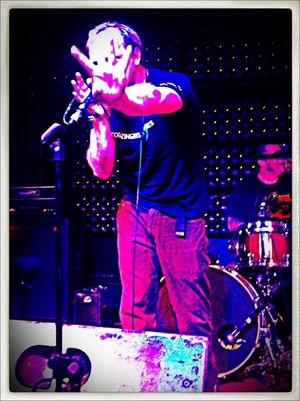This year’s New York Comic Con presented by ReedPop at the Jacob K Javits Convention Center was as well-attended if not more so than any in its history, despite the fact that actors couldn’t promote their works due to the SAG-AFTRA strike (which as of this writing is finally over). However, this is not to say that attendees weren’t able to interact with amazing creators, learn about exciting forthcoming properties, and celebrate all things nerd culture. Authors took center stage this year, from comics creators Scott Snyder’s ARCBOUND, Geoff Johns’ GHOST MACHINE, and multiple panels from genre authors exploring the growing popularity at the intersection of fantasy, mystery, and science fiction.
One such author frolicking in this intersection is Mur Lafferty, writer of Six Wakes, The Shambling Guides series, and the novelization of the film SOLO: A STAR WARS STORY. Her newest series, The Midsolar Murders, follows an amateur sleuth who is hounded by murder at every turn, as though her mere presence brings the curse of murder into existence. To combat this senseless waste of human life, Mallory Viridian literally leaves the Earth, much as I wanted to do the first time I heard Florida Georgia Line and Nelly attempt to blend country music with hip hop. Mallory does so selflessly, however, as her intention is that less humans will die if there aren’t any around to kill one another in her presence. Having recently made their visitations known publicly, aliens have formally introduced themselves to humanity and inhabit sentient space stations in distant orbit, where they’re firmly ready not to welcome human tourists. But, like ants, humanity still finds a way to go where it isn’t wanted, and chaos breaks out on Station Eternity in the book that bears its name.
Station Eternity is a wonderful book - funny, intelligent, imaginative, and startlingly human. It’s a fun read, and Mallory Viridian is an intrepid protagonist, even if she doesn’t think so. The colorful characters that make up Mallory’s cadre of friends, both human and alien, evoke a warmth of friendship that’s STAND BY ME meets BABYLON 5. It’s the perfect comfort book for those who want some Agathie Christie in their Arthur C. Clarke, or just think Columbo would be that much funnier and more endearing if he could do his thing in space.
I chatted with Mur Lafferty first thing in the morning on the first day of the Con, before either of us had had our coffee. Bear with us, please.
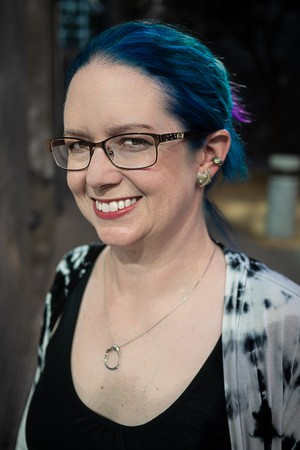
Eric McClanahan - So we’re talking about Station Eternity. I loved the book, I thought it was very inventive.
Mur Lafferty - Oh thank you!
EM - I loved the mystery elements and the sci-fi elements; I thought they played really well together. I read a lot of scifi and high fantasy and a lot of times the names are just unmanageable and I use a form of selective synesthesia when I’m reading. So if I see a name that’s like thirty-eight letters long and starts with a “D” I just say “His name is D now.” Your aliens have stereotypically human names. Where did that idea come from?
ML - I don’t know if I should be honest or not. [pause] I feel like when it comes to dealing with human and alien interaction and language you either ignore it completely, like STAR TREK, or you make a hand-wavy magic fix, like Douglas Adams, or you make the entire story about how we have to communicate, like ARRIVAL. I wanted to go the Douglas Adams route. I didn’t want to worry about that. I wanted everything else to be, literally, alien but not worry about names. So I have created a little device that, like the Babel Fish [from The Hitchhiker's Guide to the Galaxy], goes in your ear and taps into a galactic database of translation. So what it’s done is that it decides that people you meet have a name that you understand, and when you say that name they hear their name, and that’s how I fixed it. Sometimes I had to remember that not every name should be Anglo-Saxon, but that was mostly it. Also, I should say, I’m not very good at naming things. It’s not my strong point, so coming up with multiple aliens and multiple names in their language was not how I wanted to spend my creative time, so I just decided there was an online database out there.
EM - I like that! What was your entry into scifi? What influenced you when you were younger?
ML - I was a big reader, loved books so much, but never really felt like I could write them until I guess it was Dragonflight by Anne McCaffrey or maybe Madeleine L’Engle’s A Wrinkle in Time. But it was finding science fiction stories about women by women, which I only realized in hindsight - I didn’t say “I’m going to make a feminist decision and read this book by a woman with a woman hero,” it was more of a “Oh wow, it’s got a woman hero! I’ve gotta read it!” So McCaffrey and L’Engle probably were my first big view of “I want to be like that.” Later on it was Ursula K Le Guin, oddly enough her Lathe of Heaven. A lot of her other, more famous books haven’t grabbed me as much but for some reason Lathe of Heaven really stuck in my mind. While I definitely don’t write like her, she was an inspiration. So, yeah, I definitely skew towards science fiction by women with female heroes. And, in looking back I think (though this isn’t science fiction; more fantasy), Good Omens, when it came out I got the hardcover book club edition, which I realized is probably worth a lot of money now but I loaned it to a friend so it’s gone, but I read the hell out of that thing. It’s really awesome to learn about how [Neil] Gaiman and [Terry] Pratchett wove this tale together, like “I didn’t know you could tell stories like this!” Things like that, so I would say a mix of those things were what really made me want to be part of it.
EM - Good Omens is such a great book, and a great doorway into Gaiman’s and Pratchett’s world, and once you diverge you realize how drastically different they are. Then you read that book again and you think “Wow, this is two minds as one!” Let’s talk about the mystery elements of the book. I really enjoyed discovering how everyone was connected. As I was reading that and seeing that happen, it really evoked that Agathie Christie Then There Were None energy. Tell me about weaving that world together and what your inspirations were there.
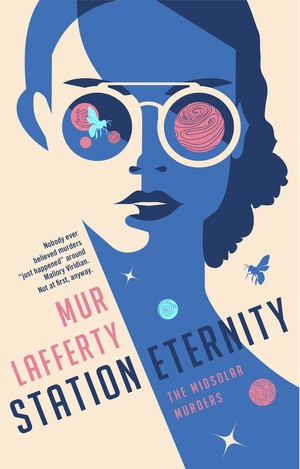
ML - My first mystery, that I wrote, was Six Wakes, which was a standalone murder-mystery in space that came out a few years ago. I’d done two urban fantasies with my publishers previously and they sold okay but they decided not to continue that series, so they asked me for some pitches, so I told them I was thinking about a clone solving their own murder mystery kind of thing. I gave them three pitches and they picked the one I had the least developed in my head and then once I sold it I realized “I just sold a murder mystery. I don’t know anything about murder mysteries.” So basically I looked at Agathie Christie as my main influence, which is why I craft a lot of my stuff like her books, because she was my main influence. I also was very influenced by MIDSOMER MURDERS and FATHER BROWN MYSTERIES. I started reading Caroline Graham’s Midsomer Murders books that the show was based on and was really amazed that her style is a lot like Stephen King’s and that gets lost, in that she will give you a character’s full backstory and you will care about them, and that gets kind of lost in the TV show because they only have a certain amount of time. But I love that it’s not just “that person killed that person,” For you to build a lot of interesting suspects, you have to have everybody with motive to do it, and that makes those connections. So unless you’re doing a big family event it’s better if everyone has a different reason for disliking the person. Unveiling the motivations of everybody, that’s where the story comes in. A lot of the challenges I’ve come up against doing a science fiction murder/mystery with my main character Mallory being on a sentient space station is that that calls for a story, as well. There’s a murder that happens on the space station that needs to be solved but then there’s other stuff going on around the murder, so balancing that is one of the challenges.
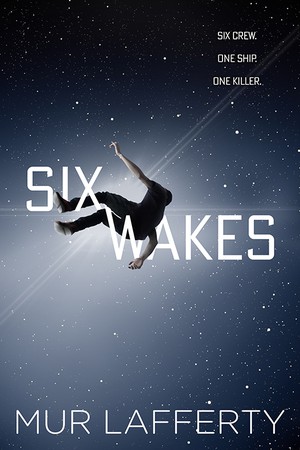
EM - I noticed, talking about the connections and the murder/mystery aspect of the book, even though quite a bit of the story is set into motion by Ren’s murder, most of the killing is a human-specific event,particularly with the connections that everyone has and the great backstory with Calliope and Xan. It’s almost an indictment of humanity that murder is a specifically human act. So what is next for Mallory Viridian? I understand there’s a sequel forthcoming?
ML - Yes, I have a copy here I can show you. They handed me some promo books today. This is Chaos Terminal, and it is out November 7th.
EM - I love The Midsolar Murders throughline. When you mentioned The Midsomer Murders I thought “Yeah, I can see that.”
ML - Yeah, so the next thing, without too much spoiler from Station Eternity, Mallory discovers that her ability, or the fact that she’s around murders all the time, has an actual reason and is connected to one of the alien races and we explore those Sundry alien races a bit more in this book. I will point out the cover has a green wasp on it and that is very purposeful. And for the murder/mystery aspect, Mallory’s old friends from high school show up on the station. There’s more with the SBI agent who investigated her, as well, because I always thought “Where are the cops who are investigating Jessica Fletcher and Father Brown?” They can’t always just be “Oh, you’re here again irritating me and solving the murder” when they should be saying “Why are you here? Did you do this?”
EM - Exactly. I mean, how long did MURDER SHE WROTE run? That’s so many dead people.
ML - Growing up the joke was that Jessica Fletcher was the most successful serial killer in history. And I found something online explaining how dangerous Midsomer County is compared to the murder capitals of the world and it would be number three, I think. So yeah, that’s one thing that the series does, is point that out. Don’t get me wrong, I love the amateur sleuth books. They’re very fun, and people like seeing the cupcake store owner solving the murder over the hard-boiled detectives in crime fiction. But it was almost visceral, enjoying the stories while also thinking “Why isn’t anybody pointing this out?” And I know why - it’s not part of the stories and there’s not really a way you can answer it, but it always bothered me. So I thought, if someone had that power, she’d be a pariah. No one would invite her to the birthday parties. Then it’s like, I’m a big fan of BABYLON 5, so I thought “what if you were like that and had the chance to leave?” Because isolating herself was sad, so that’s why she goes to space. So just hanging a lantern on that “ability” was important to me.
EM - So, approaching the storybuilding with the mystery elements, do you think you’re more of a Mallory or more of a Sam? [For context, Sam is a superfan of Mallory’s and mystery nut who travels to Station Eternity to meet her, thinking he may have solved one of her unsolved murders through clues he found in her writing.]
ML - Oh, gosh. I would say probably Mallory. I mean, I think everybody puts a little bit of themselves in their hero. Mallory’s not infallible but she’s certainly braver than I am. A lot of the conflicts in mysteries, as opposed to high-concept science fiction, come from personal conflicts you may have had in the past or small personality quirks that put up barriers between you and what you’re trying to do. That was something to investigate, too. Or explore, I should say. So, that’s what I would say.
EM - Well, it’s a great book and I can’t wait to read the next one.
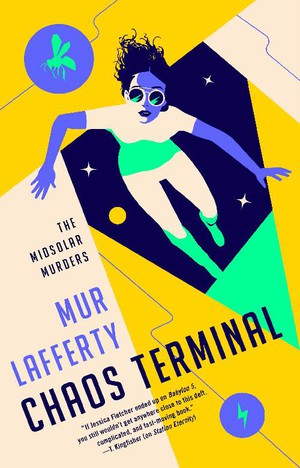
ML - Thank you. You know, people are writing a lot of important stuff right now but I am happiest writing escapism. One of my favorite things about cozy mysteries is that there’s a beginning, a middle, and an end. You’re not going to come to the end of Chaos Terminal or Station Eternity saying “Well, that was a downer. I sure hope they get out of this predicament in the next book.” Because you get the beginning, middle, and end. The bad guy is found and dealt with in a variety of ways in both books and it’s just escapism. Sometimes you don’t think you’re writing important things if you write something light and fun and then someone emails you and says “I was sitting beside my mother in the hospital while she was dying and your book made me laugh” and that meant the world to me when I got that email. So I write escapism and I’m learning that it’s actually important, too. Especially these days.
EM - I see in the Festival Programming that you’re featured on a panel called “The Best Advice I Ever Got.” I can’t make it because I have another interview at that time, so could you give me a little preview?
ML - You know, it’s funny: I haven’t come up with anything yet. You see I have a podcast called “I Should Be Writing” where I give out advice to beginning writers and I’ve been doing so since 2005, so I’m just trying to figure out--
EM - You’ve got a lot to parse.
ML - Yeah! But really I think the biggest thing I’ve ever learned is “Don’t Quit.” I’m not saying write everyday but no one can stop you from writing except for you. Other people can give you bad feedback but the day you say “I’m not doing this anymore,” that’s your decision. If you don’t make that decision and keep writing, you will get better. I can’t promise you’ll get published but you will get better. I’d also say that one thing we do is celebrate rejections, because rejections mean that you’re a working writer. You’re just not getting paid yet. And unless you’re, I think it’s John Scalzi who’s the outlier, everybody gets rejected. Yes, I’m a pro, and I can commiserate with my listeners who get rejected because I get rejected. It just happens. Once you learn how to take that punch, it becomes easier. I know people who do really, really well in their career, and they hit big. Maybe they have a book that’s a best seller, but then their next book just does okay, and they don’t know what to do with that disappointment. But if you took your rejections and accepted the reality that you got rejected you would be able to handle that kind of disappointment better. So there is a lot of value in getting rejected and taking it and continuing and you’ve just got to tell yourself “I am doing what pro writers do, I’m just not getting paid yet.”
Station Eternity and Chaos Terminal are both available from Ace/Berkley Books, an imprint of Penguin Random House books, and be sure to keep up to date with all the things Mur Lafferty is up to on her site, Murverse.com.
Until next time, take care.
-McEric, aka Eric McClanahan-